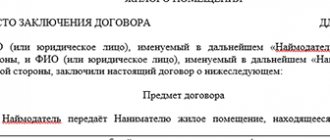Grounds for termination
In legal terms, the conclusion of any agreement, changes to any of its clauses, as well as termination itself should occur only with the mutual consent of both parties. Accordingly, a decision to unilaterally terminate any contract is possible, but it must have specific and significant reasons.
The party that decides to undertake such a procedure must immediately be aware of the possible consequences and, if necessary, be prepared in advance to justify such a step in court from the point of view of its legality. The legislation provides for such a measure and describes it in detail in articles of the Civil Code: 450, 451, 452 and 453. They state that the following grounds for unilateral refusal of a contract are possible:
- The simplest and most obvious case is that the text of the agreement itself stipulated in advance that each party could withdraw from the agreement unilaterally.
- In some cases, the law provides such an opportunity: for example, termination of an open-ended lease agreement.
- The other party has violated the terms of the original agreement, and these violations are significant. For example, the price was increased unilaterally, although the contract did not provide for such a possibility. Another example is a gross violation of the deadlines for fulfilling an obligation, as a result of which the counterparty suffered a significant loss.
- The parties did not violate the agreement, but circumstances changed in such a way that fulfillment of the agreement became unprofitable for the company. For example, for reasons beyond the control of the parties (due to drought), prices for agricultural products have increased significantly, so supplying them at the agreed price means working at a loss. Accordingly, the law sides with the injured party.
Significant change in circumstances
If the first two reasons are quite obvious, and their proof in court is not particularly difficult, then the latter represents the most complex development scenario. The main reason is that it is quite difficult to prove the occurrence of circumstances that entail unprofitable performance of the contract.
The situation is aggravated by the fact that many unscrupulous companies seek to find a “loophole” using this particular clause: in an attempt to essentially illegally terminate the contract unilaterally, they try to refer to the fact that the market situation has changed in such a way that it is now unprofitable for them to cooperate in advance stipulated conditions.
Therefore, civil legislation specifies in more detail precisely this basis for termination of an agreement. The practice of judicial proceedings shows that judges are especially strict about the evidence base in such cases. When making a decision, they proceed from the fact that the result of the review must prove that all the following conditions are met simultaneously:
- At the time of signing the agreement, each company (or citizens) could not objectively assume that the situation would change so significantly that it would become unprofitable to work under the concluded conditions. For example, companies could not objectively know that in such and such a year there would be a drought, as a result of which buckwheat prices would increase by 3-4 times.
- The situation arose for reasons beyond the control of the parties, i.e. they objectively cannot influence this process.
- Analyzing the text of the agreement, it is impossible to say that the parties assumed all the risks of changing the situation. For example, if the contract clearly states that prices cannot change under any circumstances, then each party must be aware of the consequences of signing such an agreement. In practice, such a point, of course, is extremely rare.
- The party managed to prove that if it had not terminated the contract unilaterally, but continued to perform it, this would indeed have led to losses.
Thus, when a party relies on the possibility of termination due to a changed situation, it must immediately understand that in the event of possible proceedings in court, it will often not be easy to prove its position.
Termination procedure
In order to terminate a contract, not in all cases it is necessary to go to court. Often firms or citizens try to resolve a contradiction peacefully so as not to waste additional money and time on proceedings. The law also provides for the possibility of pre-trial settlement. Therefore, in general, the procedure for terminating an agreement by decision of one party can be done in 2 ways:
- Without a lawsuit - in this case, the counterparty is sent a notice of termination (for more details, see the relevant section), which he must review and respond on the merits within 1 calendar month. If the parties managed to agree, this is the fastest and most successful solution to the problem. An agreement to terminate the contract is drawn up, a sample of which is presented below.
Such a case has a legislative definition as “unilateral refusal to fulfill the contract.” This means that the counterparty recognizes such a decision as fair, so he will no longer be able to subsequently demand through the court the fulfillment of obligations by the other party. In this sense, the document acts as an analogue of a settlement agreement - if it is signed, the parties will no longer be able to go to court again with the same claims.
- The second case is a court decision on the issue, which is defined in law as a “unilateral termination decision.” In such situations, the counterparty may go to court to invalidate the decision and oblige the defendant to fulfill his obligations, which he assumed by signing the agreement.
Unilateral termination: sequence of actions
Thus, in general, if a party intends to terminate the performance of obligations, it can adhere to the following algorithm:
- Analysis of the consequences of the step, preparation of the evidence base for possible litigation, analysis of possible risks and calculation of losses that the decision may entail.
- An attempt to verbally agree on a decision with the counterparty, explaining the situation during business negotiations.
- Sending a notice of unilateral termination.
- Making a decision based on the partner’s response: if he agrees, then the matter is resolved peacefully, and an agreement to terminate the contract is drawn up.
- If consent is not received, the party must decide what to do: fulfill the contract to the end or take a risk and terminate it, waiting for the counterparty to go to court.
- Independently going to court based on the fact that the counterparty is acting illegally by not accepting your terms.
Each specific scenario depends on a particular situation. In some cases, it is a simpler option to fulfill the contract to the end than to wait for risks to arise due to the adoption of relevant court decisions. A commentary on this topic can be seen here.
Sample
Krug LLC, referred to as the “Customer”, represented by General Director O.L. Zaitsev, working on the basis of the Charter, and Put LLC, referred to as “Executor”, represented by General Director A.A. Nosov, working on the basis of the Charter, together referred to as the “Parties”, have entered into this additional agreement to terminate the lease agreement:
Expert opinion
Kostenko Tamara Pavlovna
Lawyer with 10 years of experience. Author of numerous articles, teacher of Law
1. Lease agreement No. 44 dated February 1, 2020 is terminated as of August 1, 2020. 2. The obligations of the Parties under Agreement No. 44 terminate from the date of signing the additional agreement. 3. This additional agreement has been created in 2 copies.
General Director of Krug LLC (signature) Zaitsev O.L. General Director of Put LLC (signature) Nosov A.A.
This is important to know: Sample statement of claim to court
Why do you need a termination agreement? How to compose it correctly? What are the consequences of entering into an agreement? Download sample agreements for various situations, see recommendations for drafting, and ask questions to a lawyer.
Notice of termination of contract
Formally, such a notification should only be in writing , since an oral communication of intentions over the phone or during a personal meeting is subsequently quite difficult to document and prove in court.
Along with this, writing a document allows you to accurately establish the time frame within which the other party is obliged to respond to the notice. There can be two options:
- In general, (unless otherwise specified in the contract), the company must respond within 30 calendar days from the date of receipt of the notification (the period begins from the next day).
- If the agreement specifies such a procedure (which is extremely rare), then the parties act in accordance with it.
The notification should be drawn up in 2 copies: 1 is given to the company, and the other remains with the first party with a visa on receipt. If the document is sent by mail, this must be done only by registered mail so that there is a mark of delivery and the corresponding date.
The legislation does not have a clearly developed form of notification of the intention to terminate the contract unilaterally, so it is drawn up arbitrarily. There are several points to consider:
- A preamble that reflects who is sending the document and to whose address.
- The main part with a mandatory reference to the contract: its name, date and place of conclusion, and other essential information are indicated. It also contains the actual expression of the desire to terminate the contract, the reason is indicated and references are made to the clauses of the agreement and/or norms of civil law.
- The conclusion indicates the period within which the addressee is obliged to respond (in accordance with the agreement or legislation), as well as the date after which the contractual relationship between the companies is terminated.
- At the end there is a list of all documents that are attached to the notification, indicating their form - original or copy.
- Finally, the date, signature of the authorized person(s) with a transcript and the seal of the organization are affixed.
A sample notification of a party that the other party intends to unilaterally terminate the contract is presented below.
NOTE. The notification must be recorded in the internal document flow journal (as additional evidence of the date of its writing). The document is signed only by the director or another person who has the right to do so in accordance with internal regulations.
What to consider when terminating a deal
Termination of a transaction by agreed termination of the contract does not mean the parties return to the situation “before the transaction”.
It is always assumed that final settlements will be made, and that what the party must do will be done. This should be taken into account both when declaring a desire to terminate the contract and when responding to such a proposal or demand. It is advisable to specify specific conditions for completing the transaction in the agreement on this.
- reasons for breaking the contractual relationship, especially if these are some kind of violation of the contract or the law (here the right to recover damages, penalties, etc. arises);
- continuing rights and obligations, as well as rights and obligations for the future - how they will terminate and what this will lead to;
- possible damage or loss upon termination of the contract;
- how to document the situation with the fulfillment of obligations and rights under the contract at the time of its termination (for example, draw up a work acceptance certificate, conduct a reconciliation);
- who and what remains due after the termination of the relationship, how this debt is planned to be repaid;
- who and how will control the process of mutual settlements and their documentation.
When preparing an agreement, it is important to take into account all the “slippery” points. In addition, the agreement itself should be made clear and detailed, reflecting all the essential circumstances of the conclusion of the transaction and its termination.
When preparing agreements, examples (samples) are often used that correspond to specific types of transactions. This is convenient and allows you to see guidelines when drawing up a document.
As a rule, the agreement is prepared and agreed upon by lawyers - either invited or their own.
If the agreement has lost its relevance, then the best option for all participants would be for the parties to sign an agreement to terminate it. Such a document must be drawn up and signed in the same format as the main one.
That is, a written contract is terminated by the same agreement, and if the main document was signed by a notary, then the agreement must be certified in a similar way.
In the event that a contract that has passed State registration is terminated, this procedure is not required when concluding an agreement on its termination. Lawyers also recommend entering into a written agreement.
This is important to know: Repairs on the weekend: can it be done legally?
Termination of the lease agreement
Situations in practice often turn out to be very complex, since contracts between legal entities are often concluded for a very long period, many years, during which it is objectively impossible to foresee all possible risks associated with changes in market conditions.
One example of long-term contracts is a lease agreement. In this case, there are 2 possible scenarios:
- If the contract is concluded for an indefinite period, this is the most beneficial situation for the tenant, because it is directly provided for in civil legislation (Article 610 of the Civil Code). In this case, the party may not explain the reasons that prompted it to make the decision. In most cases, the refusal is implemented out of court on the basis of an agreement to terminate the contract. The only condition is that the tenant must notify the landlord of his intentions in advance (as specified in the contract - for example, 6 months in advance).
- If the contract is concluded for a specific period (for example, until January 1, 2020), this greatly complicates the situation for the tenant and facilitates the position of the landlord, who has the right to disagree with the notice of termination. The tenant can file a statement of claim, but it is advisable to do this if there is strong evidence of the correctness of his position.
Legal consequences
It is important to know that in the absence of an agreement, negative consequences for both parties will not be long in coming.
In addition, neglecting the issues of peaceful settlement of pressing problems may result in protracted legal proceedings , and then an agreement will have to be concluded in a higher authority.
However, in most cases, termination of the contract has a favorable outcome for both parties.
What obligations do not cease after termination?
According to paragraph 2 of Art. 453 of the Civil Code of the Russian Federation, the obligations of the partners terminate after they sign an agreement to terminate the contract, unless otherwise provided by law. But there are obligations that do not terminate regardless of the fact of termination. It could be:
- presentation of claims for violation of obligations to collect penalties and fines, which must be accrued before the date of termination of the contract (determination of the Supreme Arbitration Court of the Russian Federation No. VAS-9825/11 dated 09/07/2011);
- acceptance by one of the partners of performance under a contract from another partner and failure to fulfill the undertaken obligations. The counterparty has the right to make demands for the return of the fulfilled obligation on the basis of illegal enrichment. This provision contains clause 4, paragraph. 2 tbsp. 453 of the Civil Code of the Russian Federation (Resolution of the plenum of the Supreme Arbitration Court of the Russian Federation No. 35 of 06.06.2014);
This is important to know: Acceptance and transfer certificate of an apartment when renting: sample 2020
To protect your interests in court, it is better to use the help of our lawyers, from whom you can obtain a sample of termination of an agreement by agreement of the parties, as well as consult on all issues related to drawing up the agreement. To provide legal services, you must fill out an online application or call the numbers that are on our website.
Termination of the service agreement
In the case of such an agreement, the situation can be greatly complicated by the fact that although civil law provides for the possibility of terminating the agreement due to poor-quality services provided, it does not describe certain cases in detail.
Since the provision of services is an area with extremely diverse types of activities, termination of a contract after the fact can have a lot of reasons.
Most companies insure themselves against possible early termination, so when signing a contract you should immediately pay attention to the relevant clause. For example, if you are installing cable Internet in an apartment in which you will not live for more than a year, you need to choose those providers who do not require payment of a penalty in such cases.
A seminar with a practicing lawyer specifically on termination of a service agreement can be seen here.
Termination of an employment contract
It is clear that all cases of possible termination of employment relations are provided for by law. However, situations may arise when a company wishes to dismiss an employee unilaterally by terminating the employment contract with him. In this case, a notification is also sent to him personally or by physical mail, and it is important to take into account several features:
- The notification must be drawn up in 2 copies, like the contract itself.
- If we are talking about a fixed-term employment contract, then notice of its termination can be sent no later than 3 calendar days of the end of its validity period.
Thus, the legislation provides for the possibility of unilaterally terminating the contract at any time. However, it is important to justify your position and try to resolve all disputes with the counterparty peacefully.
Termination of a fixed-term employment contract at the initiative of the employer
As for the early termination of an employment contract at the initiative of the employer, in accordance with Article 81 of the Labor Code of the Russian Federation, there are several options:
- liquidation of the organization;
- reduction in the number of employees or staff reduction;
- failure of the employee to pass certification;
- change of owner of the company;
- violation of labor discipline by the employee, if there have already been penalties;
- a single gross violation by an employee of his duties;
- forgery of documents by a candidate during employment;
- other cases.
But it is worth considering several points that are not typical for a fixed-term employment contract. If everything is clear with the liquidation of a company (in this case, termination of an employment contract with a temporary employee will be carried out according to the general scheme), then early termination of an employment contract when reducing the number of employees has a number of subtleties.
A temporary worker, like permanent employees, must be indicated in the staffing table, filled out according to the T-3 form, approved by Resolution of the State Statistics Committee of Russia No. 1 of 01/05/2004. When reducing staff, there are a number of employees who cannot be fired. If a temporary employee replaces a permanent one, who retains his job, then early termination of the contract is impossible.
The employer has the right to periodically conduct certification of employees for suitability for the position held. For this purpose, orders, regulations and other documents are issued. If a temporary employee will be working at the time of employee certification, he may be exempt from certification due to the urgency of the contract, or may be subject to certification. If a temporary worker fails to pass certification, the fixed-term employment contract with him or her can be terminated early under part three of Article 81 of the Labor Code of the Russian Federation.
Chapter 30 of the Labor Code of the Russian Federation provides for penalties for violations of labor discipline, and part 5 of Article 81 of the Labor Code of the Russian Federation provides for the dismissal of an employee for repeated violations of labor discipline. An employee hired under a fixed-term employment contract, like any employee, may be punished if labor discipline is violated, including dismissal. The situation is similar with part 6 of Article 81 of the Labor Code of the Russian Federation. A temporary worker may be subject to dismissal if he commits the following series of violations:
- failure to appear at work for more than half a shift without a good reason (absenteeism);
- appearing on company premises in a state of intoxication;
- disclosure of protected secrets;
- serious violations of labor protection, if this resulted in death or serious harm to human health;
- proven act of theft at the place of work.
In these cases, any employee (including temporary ones) can be fired. For any of the above reasons, the employer is obliged to draw up a report on the employee’s violation of labor discipline. Further, the procedure for bringing to disciplinary liability is prescribed in Art. 193 Labor Code of the Russian Federation.
But it is worth remembering that an employee can always go to court and protest the employer’s decision.





